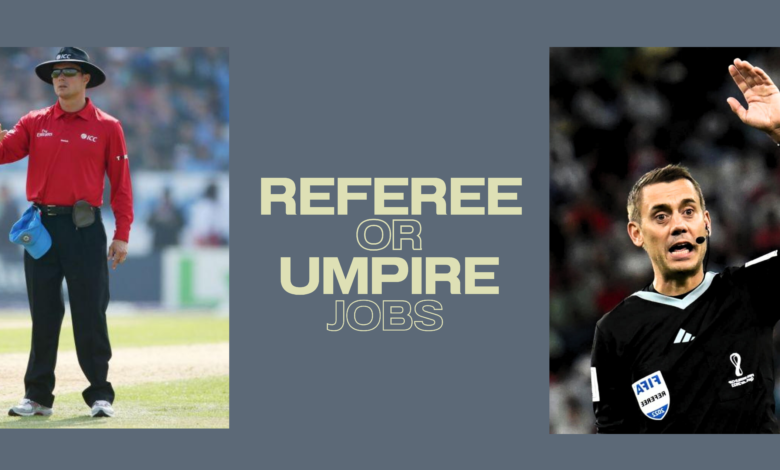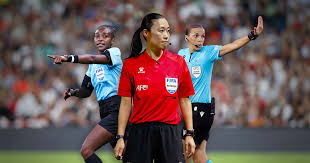Referee or Umpire Jobs

Referee or Umpire Jobs
Discover the ins and outs of referee or umpire jobs, including qualifications, career paths, and earning potential. Explore the essential skills needed for a successful career in sports officiating.
Introduction:
Referee and umpire jobs are integral to the sports industry, ensuring fair play, enforcing rules, and maintaining the integrity of the game. These roles require a unique blend of skills, from quick decision-making to handling pressure. Whether in the heat of a football match or the tense atmosphere of a baseball game, referees and umpires are vital figures who help sports run smoothly. In this comprehensive guide, we’ll explore what it takes to succeed in these roles, the different sports requiring referees and umpires, and the exciting career opportunities available.
What Are Referee and Umpire Jobs?
Referees and umpires are officials responsible for enforcing the game’s rules, making decisions on plays, and ensuring that players adhere to the standards of conduct. These roles have evolved significantly over the years, with roots that can be traced back to the early days of organized sports. Referees are typically associated with sports like football and basketball, where they oversee the game’s flow and make calls on fouls, goals, and other critical moments. On the other hand, Umpires are more commonly found in sports like baseball and cricket, where they judge on pitches, hits, and outs.
The significance of these roles cannot be overstated. Without referees and umpires, games would lack structure, leading to chaos and disputes. These officials uphold the fairness and integrity of the sport, ensuring that every game is played according to the rules.
Differences Between Referees and Umpires:
While referee and umpire are often used interchangeably, they refer to different roles within the sports world. The primary difference lies in the sports they officiate and the nature of their responsibilities.
- Referees:
Referees are typically found in sports such as football, basketball, boxing, and hockey. They are responsible for enforcing the rules, making decisions on fouls, and controlling the game’s flow. Referees often have the final say in game-deciding moments. They are crucial in maintaining the pace and fairness of the sport. - Umpires:
Primarily associated with sports like baseball, cricket, and tennis. Umpires focus on specific aspects of the game, such as judging pitches in baseball or calls at the crease in cricket. They are often stationary and have a more focused area of responsibility than mobile referees.
Understanding these differences is crucial for anyone considering a career in sports officiating, as the skills and knowledge required can vary significantly depending on the sport.
Types of Sports That Require Referees:
Referees play a pivotal role in various sports, each with its rules and demands. Some of the major sports that rely on referees include:
- Football (Soccer):
Referees in football are responsible for enforcing the rules of the game, making calls on fouls, goals, and offsides, and ensuring player conduct adheres to the standards set by the governing bodies.

- Basketball:
Referees monitor the game closely, making split-second decisions on fouls, scoring, and game violations such as traveling or double dribbling. - Boxing:
Boxing referees are tasked with ensuring the safety of the fighters, making calls on fouls, counting knockdowns, and stopping the fight if necessary. - Hockey:
Ice hockey referees manage the fast-paced action on the rink, making judgments on penalties, goals, and other critical game elements. - Rugby:
Referees in rugby oversee the game, ensuring fair play, managing scrums, and making decisions on tries and conversions.
Each sport requires referees to have an in-depth understanding of the rules, the ability to make quick decisions, and the confidence to enforce the rules in high-pressure situations.
Types of Sports That Require Umpires:
Umpires, like referees, are essential in several sports, often focusing on specific aspects of the game. Sports that rely heavily on umpires include:
- Baseball:
Umpires in baseball are responsible for making calls on balls and strikes, safe or out decisions at bases, and other on-field rulings. They play a crucial role in maintaining the flow and fairness of the game.

- Cricket:
In cricket, umpires make decisions on various issues, from judging whether a batter is out to overseeing the fairness of the bowlers’ actions. Their choices can significantly impact the match’s outcome. - Tennis:
Tennis umpires, including line judges, are responsible for calling balls in or out, managing player conduct, and ensuring the match is played according to the rules. The chair umpire has the final say on disputed calls. - Badminton:
Umpires in badminton oversee the match, ensure the game is played moderately, and make calls on faults, in or out, and other game elements.
These sports require umpires to be highly knowledgeable about the rules, able to focus intensely for extended periods, and capable of handling disputes with authority.
Essential Skills for Referees and Umpires:
Specific skills are essential to succeed as a referee or umpire. These include:
- Decision-Making:
Referees and umpires must make quick, accurate decisions that can significantly impact the game’s outcome. This requires a deep understanding of the rules and the ability to assess situations rapidly. - Communication:
Clear and authoritative communication is vital for referees and umpires. They must convey their decisions to players, coaches, and spectators effectively, often in high-pressure situations. - Physical Fitness:
Officiating can be physically demanding, particularly in fast-paced sports like football or basketball. Referees and umpires must maintain good physical condition to keep up with the play and maintain concentration throughout the game. - Impartiality:
Maintaining impartiality is critical in officiating. Referees and umpires must be unbiased and fair, making decisions based solely on the rules and the situation. - Knowledge of the Game:
A thorough understanding of the sport’s rules, strategies, and nuances is essential for effective officiating. Continuous learning and staying updated with rule changes are important aspects of the job.
These skills are the foundation of successful officiating. They are honed through experience, training, and a deep passion for the sport.
Qualifications Needed for Referee or Umpire Jobs:
Becoming a referee or umpire requires more than just a passion for sports; specific qualifications are necessary to perform the role effectively. These qualifications often include:
- Educational Background:
While there is no strict educational requirement, a background in sports science, physical education, or a related field can be beneficial. Understanding athletes’ physical and psychological aspects can enhance an official’s ability to manage games effectively. - Certifications:
Most sports require referees and umpires to obtain certifications from recognized governing bodies. These certifications typically involve passing exams that test knowledge of the sport’s rules and officiating procedures. - Experience:
Practical experience is invaluable. Many referees and umpires start at the amateur level, gaining experience before moving to professional leagues. Volunteering at local sports events or working with youth leagues can be an excellent way to start. - Continued Education:
Referees and umpires must stay updated with rule changes and new officiating techniques. Regular workshops, seminars, and recertification exams are often required to maintain qualifications.
These qualifications ensure that referees and umpires are well-prepared to handle the demands of officiating at any level of competition.
The Training Process for Referees and Umpires:
Training is a critical component of becoming a successful referee or umpire. The process typically includes:
- Classroom Instruction:
Many certification programs begin with classroom instruction, where candidates learn the game’s rules, officiating techniques, and the role of a referee or umpire. - On-Field Training:
Practical experience is gained through on-field training, where candidates practice making calls, managing games, and handling real-time pressure. This training often takes place in simulated environments or lower-level games. - Mentorship:
Working under experienced officials as a mentee can provide invaluable insights and feedback. Mentorship allows aspiring referees and umpires to learn from seasoned professionals, refining their skills and gaining confidence. - Evaluation:
Continuous evaluation is part of the training process. Referees and umpires are often assessed on their knowledge, decision-making, and performance during games. Feedback is provided to help them improve and prepare for higher levels of competition.
Training programs are designed to gradually build the necessary skills and knowledge, preparing referees and umpires for the complexities of officiating at various sports levels.
Certification Bodies for Referees and Umpires:
Various organizations provide certification and oversight for referees and umpires in different sports. Some of the most prominent include:
- FIFA (Fédération International Football Association):
Football referees worldwide and offers certification and training for officials at all game levels. - NBA (National Basketball Association):
The NBA oversees the certification and training of basketball referees in the United States and sets high standards for officiating in professional basketball. - MLB (Major League Baseball):
MLB provides certification and training for baseball umpires, with rigorous programs designed to ensure top-tier officiating in professional baseball. - ITF (International Tennis Federation):
The ITF certifies tennis umpires and ensures they are equipped to officiate at all levels, from local tournaments to Grand Slam events. - ICC (International Cricket Council):
The ICC oversees the certification of cricket umpires and offers training programs that prepare officials for the complexities of international cricket.
These certification bodies ensure that referees and umpires meet the standards required to officiate in professional sports, maintaining the integrity and fairness of the games.
The Role of Technology in Referee and Umpire Jobs:
Technology has become an increasingly important part of sports officiating, with tools like VAR (Video Assistant Referee) and instant replay systems helping ensure decision-making accuracy. The role of technology includes:
- VAR in Football:
VAR allows referees to review decisions using video footage, helping to correct mistakes and make more accurate calls. This technology has been a game-changer in football, reducing controversies and improving fairness.

- Instant Replay in Basketball and Baseball:
Instant replay systems enable referees and umpires to review plays and make informed decisions, particularly in close or contentious situations. This technology has helped reduce errors and ensure the correct calls are made. - Hawk-Eye in Tennis:
Hawk-Eye technology tracks the ball’s trajectory and determines whether it was in or out, providing umpires with accurate information to make calls. - Impact on Officiating:
While technology has improved the accuracy of officiating, it has also introduced new challenges, such as delays in the game and the need for officials to adapt to using these tools effectively.
Integrating technology into officiating has enhanced the role of referees and umpires, allowing them to make more precise decisions and ensuring the integrity of the game.
Challenges Faced by Referees and Umpires:
Referees and umpires face numerous challenges, both on and off the field. Some of the most common include:
- Pressure and Scrutiny:
Referees and umpires are often under intense pressure, scrutinizing their decisions by players, coaches, fans, and the media. This pressure can be overwhelming, especially in high-stakes games. - Controversial Decisions:
Making a controversial call can lead to backlash, including criticism from fans and players and, in some cases, threats or harassment. It is crucial to handle these situations with professionalism. - Maintaining Concentration:
Officiating requires sustained concentration, particularly in fast-paced sports where decisions must be made quickly. Fatigue and distractions can impact performance. - Dealing with Players and Coaches:
Referees and umpires must manage interactions with players and coaches, who may question or challenge their decisions. Maintaining authority and control in these situations is essential. - Adapting to Rule Changes:
Sports rules are constantly evolving, and referees and umpires must stay updated with these changes to ensure they are enforcing the latest standards.
Despite these challenges, referees and umpires play a vital role in maintaining the fairness and integrity of sports, making their contribution invaluable.
Career Pathways for Referees and Umpires:
A career in officiating offers various pathways, with opportunities to progress through different levels of competition. Joint career trajectories include:
- Starting at the Amateur Level:
Many referees and umpires begin their careers in amateur leagues or youth sports, gaining experience and building their reputation. - Progressing to Semi-Professional and Professional Levels:
With experience and certification, referees and umpires can move up to officiate in semi-professional and professional leagues, where the stakes are higher and the competition more intense. - International Officiating:
Top-level referees and umpires may have the opportunity to officiate at international events, such as the World Cup, Olympics, or Grand Slam tournaments. These roles are highly prestigious and require exceptional skill and experience. - Specializing in a Specific Sport:
Some officials specialize in one sport, becoming experts in its rules and officiating techniques. Specialization can lead to opportunities to officiate at the highest levels of that sport. - Moving into Officiating Management or Education:
Experienced referees and umpires may transition into officiating supervisors, trainers, or instructors, helping to educate and mentor the next generation of officials.
A career in refereeing or umpiring can be both rewarding and challenging. It offers the opportunity to be at the heart of the action in the sports world.
How to Get Started as a Referee or Umpire:
For those interested in becoming a referee or umpire, starting can be straightforward but requires dedication and effort. Here’s how to get started:
- Research the Requirements:
Research the specific requirements for the sport you are interested in. Each sport has its own set of rules, certification processes, and qualifications. - Gain Experience:
Start by volunteering at local sports events or joining community leagues. Gaining hands-on experience is crucial to understanding the dynamics of officiating. - Enroll in a Certification Program:
Most sports require referees and umpires to be certified. Enroll in a certification program offered by the sport’s governing body. This will involve both classroom instruction and practical training. - Find a Mentor:
Seek out a mentor who has experience in officiating. A mentor can provide guidance, share insights, and help you navigate the challenges of starting your career. - Network with Other Officials:
Networking is essential in the officiating community. Attend workshops, seminars, and conferences to meet other officials, share experiences, and learn from others. - Apply for Jobs:
Once certified, begin applying for officiating jobs at the amateur level. As you gain experience, you can move up to higher levels of competition.
Starting a career as a referee or umpire requires patience, persistence, and a passion for the sport. You can build a successful career in this field with the right approach.
The Importance of Networking in Officiating Careers:
Networking plays a crucial role in the career development of referees and umpires. Building connections within the sports community can lead to new opportunities and provide support throughout your career. Critical aspects of networking include:
- Joining Officiating Associations:
Many sports have officiating associations that provide resources, training, and networking opportunities. Joining these organizations can help you stay informed and connected. - Attending Workshops and Conferences:
Workshops and conferences are excellent opportunities to meet other officials, share experiences, and learn from industry leaders. These events often feature training sessions and discussions on the latest trends in officiating. - Engaging with Mentors:
A mentor can be invaluable in officiating. A mentor can offer advice, provide feedback, and help you navigate the profession’s challenges. - Building Relationships with Coaches and Players:
Positive relationships with coaches and players can enhance your reputation as an official. While maintaining impartiality, being approachable and professional can help build trust and respect. - Leveraging Social Media:
Social media platforms can be helpful for networking with other officials, sharing your experiences, and staying updated on the latest news and developments in the officiating world.
Networking is not just about finding job opportunities; it’s also about building a support system and learning from others in the field.
Earning Potential for Referees and Umpires:
The earning potential for referees and umpires varies widely depending on the sport, level of competition, and experience. Factors that influence earnings include:
- Level of Competition:
Officials at higher levels of competition, such as professional leagues, tend to earn more than amateur or semi-professional levels. For example, NBA referees or MLB umpires can earn substantial salaries, while those in lower leagues may earn less. - Sport:
Earnings also vary by sport. Referees in popular sports like football or basketball may earn more than those in less mainstream sports. - Experience:
More experienced referees and umpires typically command higher service fees. As you gain experience and build a reputation, your earning potential increases. - Type of Employment:
Some referees and umpires work full-time, while others work part-time or freelance. Full-time officials may receive salaries, benefits, and bonuses, while freelancers are paid per game or event. - Geographical Location:
Earnings can also vary by location. Referees and umpires in regions with a high demand for sports officials may earn more than those in less active areas.
On average, referees and umpires can earn anywhere from a few hundred to several thousand dollars per game, with top officials earning six-figure salaries annually. However, the financial rewards are often accompanied by the challenges and pressures of the job.
Freelance vs. Full-Time Referees and Umpires:
Choosing between freelance and full-time officiating can have significant implications for your career. Here’s a comparison of the two options:
- Freelance Officiating:
Freelance referees and umpires work on a per-game or per-event basis. This allows for flexibility in scheduling and the ability to officiate in different sports or leagues. Freelancers can choose their assignments, but their income may need to be more stable, and they are responsible for their benefits and expenses. - Full-Time Officiating:
A specific league or organization typically employs full-time referees and umpires. They receive a regular salary and benefits and may have more job security. However, they may need more flexibility in choosing assignments and may need to travel frequently. - Pros and Cons:
Freelance officiating offers greater flexibility and the opportunity to work in various sports, but it can be less financially stable. Full-time officiating provides stability and benefits but may require a higher level of commitment and less flexibility.
Deciding between freelance and full-time officiating depends on your career goals, financial needs, and lifestyle preferences.
Female Referees and Umpires in Sports:
The presence of female referees and umpires in sports has been growing, with more women breaking into what has traditionally been a male-dominated field. Key points include:
- Challenges Faced:
Female referees and umpires often face unique challenges, including gender bias, discrimination, and the need to prove their competence in a male-dominated industry. These challenges can be complex, but many women have risen above them to achieve success. - Success Stories:
There are numerous success stories of female referees and umpires making their mark in various sports. For example, Sarah Thomas became the first female official to work in the Super Bowl. Sian Massey-Ellis was a pioneering female assistant referee in the English Premier League. - Impact on the Industry:
The increasing presence of female officials is helping to change perceptions and encourage more women to pursue careers in officiating. Their success paves the way for future generations of female referees and umpires. - Opportunities for Women:
As more sports organizations promote diversity and inclusion, opportunities for female referees and umpires are expanding. Women interested in officiating are now finding more support and resources to help them succeed.
Female referees and umpires are playing an increasingly important role in sports, contributing to the diversity and professionalism of officiating at all levels.

Ethical Considerations in Referee and Umpire Jobs:
Ethics play a crucial role in the careers of referees and umpires, who must always uphold the integrity of the game. Vital ethical considerations include:
- Impartiality:
Referees and umpires must remain impartial and fair, making decisions based solely on the rules and the situation. Any bias or favoritism can undermine the integrity of the game. - Conflict of Interest:
Officials must avoid situations where personal interests, such as relationships with players, coaches, or teams, could influence their decisions. Transparency and honesty are essential to maintaining trust. - Upholding the Rules: Referees and umpires are responsible for enforcing the rules of the game consistently and accurately. Ignoring or bending the rules for any reason is unethical and can damage the sport’s credibility.
- Handling Disputes:
How officials handle disputes and disagreements can reflect on their professionalism. Maintaining composure, listening to concerns, and explaining decisions are important aspects of ethical officiating. - Integrity:
Above all, referees and umpires must act with integrity, maintaining high standards of conduct on and off the field. Their actions set an example for players, coaches, and fans.
Adhering to ethical principles is essential for referees and umpires, ensuring they perform their duties honestly, fairly, and professionally.
Mental and Physical Fitness Requirements:
Maintaining mental and physical fitness is crucial for referees and umpires, who must perform at their best in demanding environments. Key aspects include:
- Physical Fitness:
Officiating often requires officials to keep up with the game’s fast pace. This means staying in good physical condition, focusing on endurance, agility, and strength. Regular exercise, a healthy diet, and proper rest are essential. - Mental Fitness:
Officiating can be mentally taxing, with officials needing to stay focused, make quick decisions, and handle pressure from players, coaches, and fans. Mental fitness involves maintaining concentration, managing stress, and staying calm under pressure. - Continuous Training:
Both mental and physical fitness require constant training. Officials should engage in regular workouts, cognitive exercises, and practice games to keep their skills sharp and their bodies and minds ready for the demands of officiating. - Injury Prevention:
Physical fitness also involves preventing injuries, which can sideline officials and impact their careers. Stretching, proper warm-ups, and wearing appropriate gear can help reduce the risk of injury.
Maintaining mental and physical fitness is key to being an effective referee or umpire. It enables officials to perform their duties to the best of their abilities.
The Future of Referee and Umpire Jobs:
The roles of referees and umpires are evolving, influenced by technological advancements, changing sports landscapes, and new expectations. The future of these jobs includes:
- Increased Use of Technology:
As technology advances, tools like VAR, instant replay, and AI-driven analytics will become more integrated into officiating. Refers and umpires must adapt and learn to work with these technologies effectively. - Changing Expectations:
As sports become more commercialized and globally watched, the expectations of referees and umpires will increase. This includes higher demands for accuracy, fairness, and professionalism. - Greater Diversity and Inclusion:
The push for diversity and inclusion in sports will likely lead to more opportunities for women, minorities, and individuals from diverse backgrounds in officiating roles. This will enrich the officiating community and bring new perspectives to the field. - Ongoing Professional Development:
Continuous learning and professional development will become increasingly crucial as referees’ and umpires’ roles evolve. Officials must stay updated on the latest rule changes, officiating techniques, and ethical standards. - Globalization of Sports:
As sports continue to globalize, there will be more opportunities for referees and umpires to officiate in international events, requiring them to be knowledgeable about different cultures and adaptable to various sports environments.
The future of referee and umpire jobs looks promising, with opportunities for growth, innovation, and greater recognition of their importance in sports.

Conclusion:
Referee and umpire jobs offer a unique and rewarding career path for those passionate about sports. These roles are essential to the integrity and fairness of the games we love, requiring a blend of skills, dedication, and continuous learning. Whether you’re just starting or looking to advance in your officiating career, the opportunities are vast, and the impact you can make is significant. As sports continue to evolve, so will the roles of referees and umpires, ensuring that they remain at the heart of the action and upholding the spirit of the game.
FAQs
- What qualifications do I need to become a referee or umpire?
To become a referee or umpire, you typically need certification from the sport’s governing body, gain practical experience, and undergo training in the sport you wish to officiate. - How much do referees and umpires earn?
Earnings vary depending on the sport, level of competition, and experience. Professional referees and umpires can earn from several thousand to six-figure salaries annually. - What are the main challenges faced by referees and umpires?
Referees and umpires face pressure from players and fans, making split-second decisions, dealing with controversial calls, and maintaining physical and mental fitness. - How do I get started as a referee or umpire?
Start by researching the requirements for your chosen sport, gaining experience through volunteering, enrolling in a certification program, and networking with other officials. - What role does technology play in refereeing and umpiring?
Technology plays an increasingly important role, with tools like VAR, instant replay, and Hawk-Eye helping to ensure accuracy in officiating and reducing the likelihood of incorrect calls. - Can I work as a part-time referee or umpire?
Yes, many referees and umpires work part-time or freelance, especially at the amateur or semi-professional levels. Full-time opportunities are more common in professional sports.




